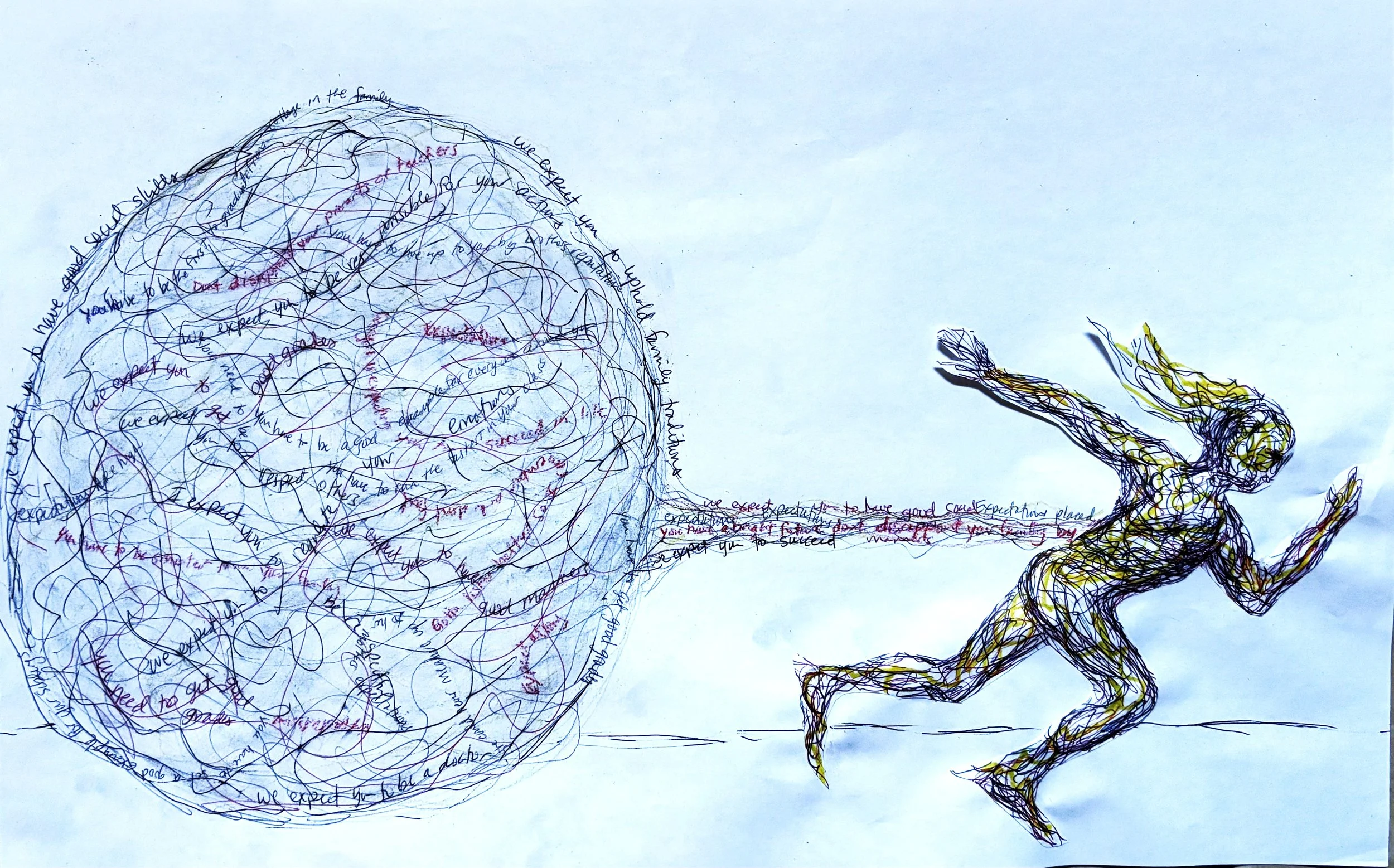Running in Place: Samson and His Calling
Illustrated by Cathy Martin
By Bill Valine
Of all the students I have had over the years, two stand out in my mind. The first was a 7th grader who was one of the best students in the school - an overachiever who worked hard to get good grades. But she had recurring panic attacks.
It turns out that she had an older brother in high school who was able to get straight A’s with very little effort and her mother would repeatedly compare her to him.
No matter how hard she tried, she felt that she could never measure up to her mother’s expectations. She always felt as if she were disappointing her, and this left her dangerously insecure.
The second student was an 8th grader who was the oldest and brightest child in a large family. No one in his family had ever gone to college and everyone expected that he would be the first.
He was praised often for how smart he was and for how bright a future he had. It was a surprise and a disappointment to his family when his high school girlfriend became pregnant.
It is not easy to live up to the expectations placed on you by others. Just ask Samson.
Even before he was conceived, the expectations were high. The Angel of the Lord told his mother, “Indeed now, you are barren and have borne no children, but you shall conceive and bear a son. Now therefore, please be careful not to drink wine or similar drink, and not to eat anything unclean. For behold, you shall conceive and bear a son. And no razor shall come upon his head, for the child shall be a Nazirite to God from the womb; and he shall begin to deliver Israel out of the hand of the Philistines” (Judges 13:3-5).
As Samson grew up there were two constants in his life: the Philistines were the oppressors of Israel, and he was to be Israel’s deliverer.
The story of the Angel of the Lord’s visit to his parents had been told and retold for as long as he could remember. At first, he enjoyed hearing the story and he enjoyed the attention it brought him. But as he grew older, that story became a burden, as fame made him feel isolated and alone.
Being a Nazirite meant that he was different; separate. He was not free to do what others could do. He hadn’t made that vow; others made it for him, and he chafed against the restrictions.
When he chose a Philistine girl to marry, his parents said, “Aren’t there any eligible girls among your own people?” To Samson the answer seemed to be no.
He was the great Samson, not someone to be friends with, let alone marry! With foreign women, there were no expectations. He could relax.
Samson judged Israel for twenty years, but he showed great reluctance to fulfill his calling – only fighting the Philistines when prodded into it, and only taking the fight as far as he felt necessary.
Illustrated by Cathy Martin
He never ran away from God’s call in the sense that Jonah did. Still, Samson was running; he was just running in place.
He kept his Nazarite vow by not cutting his hair, but his heart was not in it; he chafed against the restraints and pushed them to the edge.
He was not to eat or drink anything that came from the vine, yet he went to his wife in Timnah on the River Sorek (translated, choice vines). He took honey from the carcass of the lion he had killed, when the law in Leviticus 11:39-40 forbids touching the body of a dead animal.
It was as if he rejected his calling but could not bring himself to be the one to break his vow outright. It was as if he wanted to be disqualified by God or by default.
Samson certainly does not appear to have been overly concerned about the welfare of his people. It should be pointed out, though, that the people did not seem to be overly concerned with Samson’s wellbeing, either. They wanted him to be their deliverer, but they made no effort to participate in that deliverance.
Gideon was also a reluctant judge. In Judges 6:15 he said to the Angel, “Oh my Lord, how can I save Israel? Indeed my clan is the weakest in Manasseh, and I am the least in my father’s house.” But when he did act, he had the support of his servants, his father, his clan, his tribe, and the tribes of Asher, Zebulun, and Naphtali (Judges 6:27-35).
Samson had no one.
When Samson’s wife was given to another man, he retaliated by burning the Philistines’ crops. In response, the Philistines murdered the woman and her family, and Samson attacked them with a great slaughter (Judges 15:1-8).
You would think that when news of his victory got back to his people, they would rally behind him, yet there is no mention of their response. Rather, he appears more isolated than ever.
Returning from that slaughter, he doesn’t go back home, but to the cleft of the rock of Etam (translated: hawk’s ground) high up in the mountains of Judah, west of Bethlehem.
The Philistines threatened to attack Judah unless they handed Samson over, so his own people arrested him. Samson did not resist, but when he saw the enemy, the Spirit of God came upon him and he used the jawbone of a donkey to kill a thousand Philistines (Judges 15:14).
You would think that Israel would rally behind him then, but again there is no response. Is it any wonder that he was less than enthusiastic about his calling to free them from the Philistines?
Samson also had an increasing tendency to wander ever farther from Israel: going first to Timnah, which was near his home in Zorah and Eshtaol; but then when he had to furnish thirty men with changes of clothing after losing the bet at his wedding feast, he passed Timnah and went to Ashkelon. Of the five major cities of the Philistines (Ekron, Gath, Ashdod, Ashkelon, and Gaza) only Gaza was farther away than Ashkelon; and later, he saw a prostitute in Gaza.
In the engraved pictures on Egyptian buildings, the Philistines are shown with short hair. Samson, with his uncut hair, would have been easily recognized there, and should have avoided Gaza as one of only two Philistine cities that had a temple dedicated to Dagon.
When Samson was with Delilah, he was physically closer to home, but his heart was further away than ever. From Delilah’s repeated questioning of him about his strength, and her subsequent testing of his responses, he had to have known that she was in league with the Philistine leaders.
But he displayed a dangerous measure of fatalism. He figured it did not matter what he did since God would still protect him. After all, hadn’t God protected him for twenty years, despite his many bad decisions?
By telling Delilah his whole heart, Samson finally violated his vow. When the Philistines cut his hair, it was as if he had cut it himself. He had broken his vow but he was not released from it.
If a Nazirite became unclean, he had to undergo a lengthy ritual and begin the vow from the beginning (Numbers 6:9-12). The chronicler makes it clear that Samson was still bound by his vow by stating that his hair had begun to grow again (Judges 16:22).
Sitting in a Philistine prison gave Samson time to see his calling in its proper light. He had told Delilah that his strength came from never having cut his hair; that his strength came from keeping his vow – but the Angel of the Lord had not linked his strength directly to that vow.
Samson now saw that God was the source of his strength, and that he desperately needed God’s help.
His prayer at the end of his life showed that he had finally faced his calling and was at peace with it: “O Lord God, remember me, I pray! Strengthen me, I pray, just this once, O God, that I may with one blow take vengeance on the Philistines for my two eyes.”
If Samson were to give us a word of warning, this is what he might share:
People saw me as a hero and thought I would be overjoyed by my calling, but I dreaded it. I felt trapped; isolated from the people and from God. I thought it was all up to me, and I knew that at some point I would fail. I thought my misery came from my vow, so on the inside, I ran. I made decisions that I hoped would make God change his mind, but He never did. I was so busy worrying about the expectations of others that I never thought to ask God what He expected of me; I never asked for His help or guidance.
If you find your story is like mine, do yourself a favor and stop running. It only makes things worse. Stop worrying about what others expect; realize it’s not all up to you. Wait for God, because if He has called you, He will give you the ability to accomplish what He has assigned to you.
Perhaps you think, I’m not called to be a leader. Then I would tell you to get involved supporting the leaders that God has placed over you. How much easier it would have been for me to fulfill my calling if the people had actively encouraged and supported me!
And remember, whatever your calling, pray! Ask God to place in your heart the desire to fulfill your calling, and patiently wait for Him. Then obeying Him will be a source of joy, not misery. Your task is to keep yourself clean and to be ready to seize the opportunities He will give you. He will do the rest.


